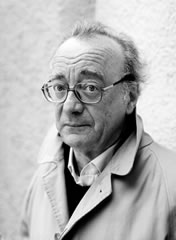 Alfred Brendel, pianist |
Brendel’s conversation with NPR’s Ben Roe and WPAS’s Neale Pearl comprised a multitude of issues and angles, in particular that it has always been a “choice to play.” Since quitting school at the age of sixteen, Brendel has also worked at painting and writing and has never been “driven” to play the piano; it has just happened. He wisely suggested this more passive approach to the many young, “overly ambitious” pianists now in the field. After the conclusion of his final European tour in December, Brendel plans to lecture more frequently and play the two-part Inventions of Bach in his spare time.
The mention of the title of his Darwin Lecture at Cambridge, Does Classical Music Have to Be Entirely Serious? (reprinted in Brendel's book Music Sounded Out), led to a question about Haydn being misunderstood and whether or not modern audience get his jokes anymore. Brendel’s swift comeback assigned the blame to performers who do not have a sense of humor; a mix of sense and nonsense is essential. The performer must take everything from the text, yet must not be its “slave.”
As a prolific recording artist, Brendel was asked if he ever listens to recordings of other performers. Answer: “Well, why shouldn’t I?” Roe blustered something about how some performers do not want their “ears clogged” after a lifetime forming their own ways, etc. Answer: “Well, that’s bullshit.” Furthermore, Brendel has refused to record Chopin’s 24 Preludes (“one of the greatest sets in the entire literature”) because he did not want to “get in the way of” Alfred Cortot’s recordings from the early 1930s. He did, however, want to “get in the way of” Artur Schnabel’s recordings of the complete Beethoven Sonatas from the same decade, which Brendel smeared as “wrong” in terms of extreme tempi; always too fast or too slow. Brendel corrected Roe when it was asserted that he was first to record the complete sonatas of Beethoven; Brendel was the first to record Beethoven's complete works.
Brendel has often attended new music concerts and appreciates the works of Kurtág, Ligeti, and Messiaen. He suggests that performers and audiences make distinctions regarding Liszt’s works due to his vast oeuvre, while advising performers to play Liszt “for getting to know the instrument and its possibilities.” He also suggested an orchestral approach to Mozart's non-improvisatory sonatas and other works.
Always grateful for the silence and concentration of his audiences, Brendel listed his favorite performance venues: 1. the Musikverein in Vienna, 2. the Concertgebouw in Amsterdam, and 3. Boston Symphony Hall. The most forgettable venue was London Festival Hall, even more so after its recent renovation, where Brendel has had trouble even recognizing the sound of his own piano. The final question from an audience member: “What can we do to change your mind about retiring?”
No comments:
Post a Comment